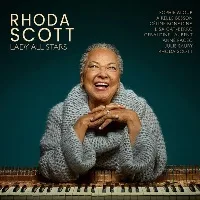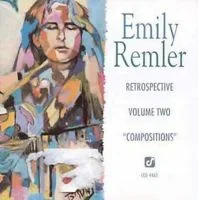Year: 1971
File: MP3@320K/s
Time: 39:12
Size: 90,1 MB
Art: Front
(6:03) 1. Extravagances
(5:52) 2. Symptones
(9:18) 3. Quiproquos
(4:47) 4. Escarmouches
(6:33) 5. Touchstone
(6:36) 6. Provocations
This amazing album was the last recording by the Clarke-Boland Big Band and features six original compositions by Francy Boland with Stan Getz as featured soloist. The album was originally released only in Europe and its current CD re-release is now out of print, which is regrettable because it features some of the finest big band compositions and performances of all time. Francy Boland, now semi-retired and living in Switzerland, has never received his due as a jazz composer. Part of this has to do with the fact that his compositions and arrangements always swing, regardless of their harmonic or contrapuntal complexity; and therefore, critics have mistaken him for a mainstream jazz composer. Another reason may be due to the fact that the C-BBB had limited exposure in America during its 12-year existence.
The first piece, "Extravagances," features a 12-tone theme and excellent solos by Getz on tenor, Sahib Shihab on alto flute and Tony Coe on clarinet. This work, along with its companion pieces, utilizes not only a lot of highly complex and dissonant harmonies, but also frequent changes of meter and tempi. The next piece, "Symptones," features Herb Geller on oboe with some fine backup by flutes and bass. Geller's multifaceted woodwind talents are also put to good use in "Quidproquos" and "Escarmouches" where he provides some outstanding solos on the English horn. Fans of Stan Kenton will appreciate the album's finale, Provocations," which has many similarities to the big production numbers featured by the Kenton bands of the 1970s as well as some of the symphonic complexities of the Innovations Orchestra of the 1950s. Albert Mandelsdorff on trombone sounds eerily like Kenton lead trombonist Dick Shearer on the out chorus. Kudos need to go to Stan Getz who instigated this collaboration and proved himself to be more than up to the challenge of Francy Boland's difficult and highly original charts.~ William Grim https://www.allaboutjazz.com/change-of-scenes-kenny-clarke-verve-music-group-review-by-william-grim
Ack Van Rooyen, flugelhorn, trumpet; Stan Saltzman, woodwinds; Sahib Shihab, alto flute, baritone sax, soprano sax, flute; Erik Van Lier, trombone; Jean Warland, electric bass, bass; Stan Sulzmann, soprano sax, tenor sax, flute; Kenny Clare, drums; Kenny Clarke, drums; Tony Inzalaco, percussion; Rick Keefer, trumpet; Rick Kiefer, flugelhorn, trumpet; Benny Bailey, flugelhorn, trumpet; Francy Boland, composer/arranger, keyboards, piano, electric piano; Art Farmer, flugelhorn, trumpet; Herb Geller, English horn, oboe, piccolo, alto sax, flute; Stan Getz, tenor sax; Albert Mangelsdorff, trombone; Tony Coe, tenor sax, clarinet; Ake Persson, trombone; Manfred Schoof, flugelhorn, trumpet; Ronnie Scott, tenor sax
The first piece, "Extravagances," features a 12-tone theme and excellent solos by Getz on tenor, Sahib Shihab on alto flute and Tony Coe on clarinet. This work, along with its companion pieces, utilizes not only a lot of highly complex and dissonant harmonies, but also frequent changes of meter and tempi. The next piece, "Symptones," features Herb Geller on oboe with some fine backup by flutes and bass. Geller's multifaceted woodwind talents are also put to good use in "Quidproquos" and "Escarmouches" where he provides some outstanding solos on the English horn. Fans of Stan Kenton will appreciate the album's finale, Provocations," which has many similarities to the big production numbers featured by the Kenton bands of the 1970s as well as some of the symphonic complexities of the Innovations Orchestra of the 1950s. Albert Mandelsdorff on trombone sounds eerily like Kenton lead trombonist Dick Shearer on the out chorus. Kudos need to go to Stan Getz who instigated this collaboration and proved himself to be more than up to the challenge of Francy Boland's difficult and highly original charts.~ William Grim https://www.allaboutjazz.com/change-of-scenes-kenny-clarke-verve-music-group-review-by-william-grim
Ack Van Rooyen, flugelhorn, trumpet; Stan Saltzman, woodwinds; Sahib Shihab, alto flute, baritone sax, soprano sax, flute; Erik Van Lier, trombone; Jean Warland, electric bass, bass; Stan Sulzmann, soprano sax, tenor sax, flute; Kenny Clare, drums; Kenny Clarke, drums; Tony Inzalaco, percussion; Rick Keefer, trumpet; Rick Kiefer, flugelhorn, trumpet; Benny Bailey, flugelhorn, trumpet; Francy Boland, composer/arranger, keyboards, piano, electric piano; Art Farmer, flugelhorn, trumpet; Herb Geller, English horn, oboe, piccolo, alto sax, flute; Stan Getz, tenor sax; Albert Mangelsdorff, trombone; Tony Coe, tenor sax, clarinet; Ake Persson, trombone; Manfred Schoof, flugelhorn, trumpet; Ronnie Scott, tenor sax
Change Of Scenes




















